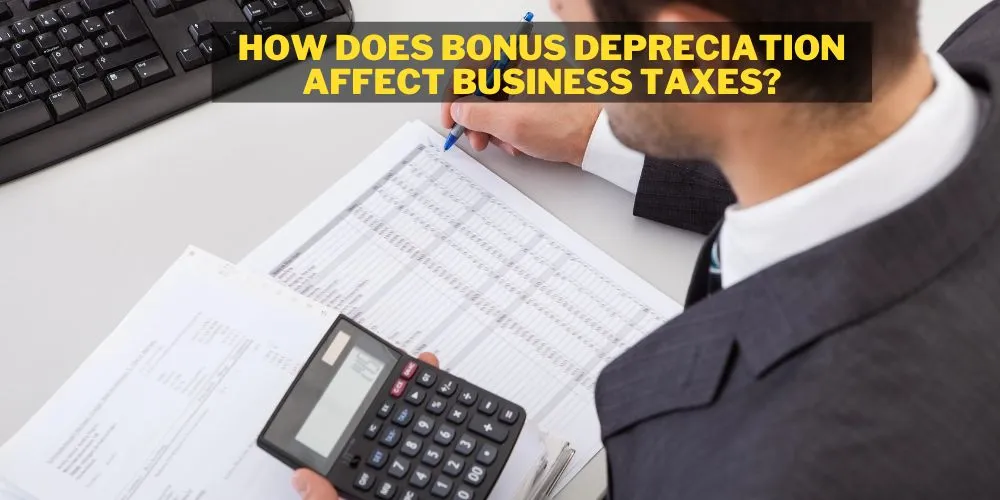In the labyrinth of business taxation, understanding the nuances of bonus depreciation stands as a beacon for savvy financial navigation.
This tax incentive allows businesses to rapidly recover costs on qualifying asset purchases by accelerating deductions, thus reducing taxable income and providing a significant boost to cash flows.
As tax laws and regulations evolve, grasping the impact of bonus depreciation on business taxes becomes imperative for entrepreneurs and financial planners alike. Let’s learn how does bonus depreciation affect business taxes.
This article demystifies bonus depreciation, offering a pragmatic guide to leveraging this provision to fortify a business’s fiscal health and strategic growth.
Understanding Bonus Depreciation
Definition and Current Legislation
Bonus depreciation is a tax incentive that allows businesses to deduct a larger portion of a qualifying asset’s purchase cost in the year it is placed in service. This provision aims to encourage business investment and economic growth.

Recent legislative changes, notably through the Tax Cuts and Jobs Act, have modified the rates and eligibility terms for bonus depreciation, making it more beneficial for businesses.
Qualifying Assets and Requirements
For an asset to qualify for bonus depreciation, it must be of a specific type, such as tangible personal property, certain computer software, or qualified improvement property.
The legislation outlines specific requirements, including the asset’s use and the purchase date, to determine eligibility.
Generally, assets must be new or, under certain conditions, used but new to the taxpayer.
How Does Bonus Depreciation Work?
Bonus Depreciation Calculation
Calculating bonus depreciation involves determining the cost of the qualifying asset and applying the current bonus depreciation rate.
For example, if a business purchases a new piece of equipment for $100,000 and the bonus depreciation rate is 100%, the business can deduct the entire cost in the year of purchase.
Comparing Depreciation Methods
Bonus depreciation differs from Section 179 depreciation and regular depreciation in several ways. While Section 179 allows immediate expensing up to a certain limit, bonus depreciation has no spending cap.
Regular depreciation spreads the asset’s cost over its useful life, resulting in smaller annual deductions.
How Does Bonus Depreciation Affect Business Taxes?
Immediate Tax Benefits
Implementing bonus depreciation can significantly reduce a business’s taxable income, leading to immediate tax savings. This reduction enhances cash flow, providing more capital for reinvestment or other purposes.
Long-term Considerations
While bonus depreciation offers immediate tax relief, businesses must consider its long-term impact. Accelerating depreciation deductions means fewer deductions in future years, potentially leading to higher taxable incomes later on.
Pro Tips for Maximizing Benefits
Strategic Asset Acquisition
Timing is crucial when acquiring new assets. Purchasing and placing them in service at the right time can optimize eligibility for bonus depreciation, offering substantial tax savings.

Businesses should also consider their future income projections to ensure they maximize the benefits of immediate expensing.
Planning for Tax Implications
Incorporating bonus depreciation into broader tax planning ensures businesses can manage tax liabilities effectively.
For instance, companies investing in startups or small businesses might also explore Qualified Small Business Stock (QSBS)—a tax incentive that allows investors to exclude up to 100% of capital gains from eligible stock sales (subject to holding periods and qualifications).
The Role of Professional Advice
Complex tax situations call for expert advice. Consulting with a tax professional is especially beneficial when navigating the intricacies of bonus depreciation.
These experts can provide personalized strategies that align with specific business needs, ensuring companies leverage tax benefits to their fullest extent.
Frequently Asked Question
What types of business entities can take advantage of bonus depreciation?
Most business entities, including sole proprietors, partnerships, and corporations, can benefit from bonus depreciation if they have qualifying assets.
How is bonus depreciation affected by the use of an asset?
To qualify, an asset must be used for business purposes. The percentage of business use can affect the amount of the depreciation deduction.
Can bonus depreciation be used for both new and used assets?
Under current law, bonus depreciation applies to both new and used assets, provided the used asset is new to the taxpayer.
How do tax law changes impact bonus depreciation?
Tax laws are subject to change, which can affect eligibility, rates, and benefits of bonus depreciation. Staying informed is crucial.
Is it possible to carry over unused bonus depreciation to subsequent years?
Bonus depreciation itself cannot be carried over. However, if a business has a net operating loss, there may be provisions for carrying over losses to offset future taxable income.
How does bonus depreciation interact with state taxes?
State treatment of bonus depreciation varies. Some states fully conform to federal rules, while others may decouple and require adjustments on state tax returns.
Conclusion
Bonus depreciation represents a powerful tax-saving opportunity for businesses. By understanding how to apply this provision effectively, companies can significantly enhance their financial positions.
Strategic planning and professional advice are key to navigating the complexities of bonus depreciation and optimizing its benefits for both immediate and long-term tax savings.
Keeping abreast of legislative changes ensures businesses remain compliant while maximizing tax incentives designed to spur investment and growth.


 Tags:
Tags:










